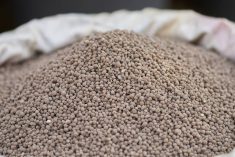A growing number of grain farmers in Quebec says they need GM crops to be profitable and that they are good for the environment
Quebec grain producers are becoming more reliant on genetically modified crops — and less worried about that.
That’s one of the findings of a survey done by a Laval University professor. When Gail West first surveyed grain farmers in the province in 2003, two-thirds of them said they were dependent on GM crops. When she repeated the survey last year, that number had risen to 80 per cent.
“They do feel a greater dependency on the GM crops than they ever did before,” said West, a professor of consumer sciences in the agriculture faculty.
Read Also

‘Devastating’: PMRA blocks Alberta’s joint emergency strychnine bid
Agency rules proposed mitigation measures insufficient to lower environmental risk, despite growing Richardson’s ground squirrel population.
A decade ago, 22 per cent of respondents said they were completely opposed to any ban on GM crops, but that number doubled in her latest survey, West told attendees at Alberta Agricultural Economics Association’s annual Visions conference in Red Deer.
A majority of respondents said GM crops were good for the environment, with 60 per cent reporting they had decreased herbicide use by growing them.
But the response to questions on herbicide-resistant weeds was concerning, West said. Even though resistant weeds have been found in Quebec, most respondents said they didn’t believe the risk of resistance was high.
“This was a shocking response to me,” said West. “I think it’s perhaps glib on the part of the farmers to think this is what the future holds.”
While a majority agreed with the statement that GM technology doesn’t reduce the need to rotate crops, 42 per cent said they rotated crops less frequently since adopting the technology.
The farmers surveyed also said they didn’t see it as a threat to organics. In 2012, there was significant agreement from the producers surveyed that GM crops can be planted near organic crops and only six per cent had heard of any issues with coexistence.
“So coexistence for them is not an issue whatsoever,” West said.
When it comes to credible information about GM crops, there’s been a shift downward for trust in scientists since 2003. However, respondents said the media has improved when it comes to providing information to the general public, and environmental organizations’ credibility showed what West called an “interesting increase.”
“Farmers are now saying those environmental organizations are somewhat credible,” West said, noting previously there was a lot of anger towards such organizations.














